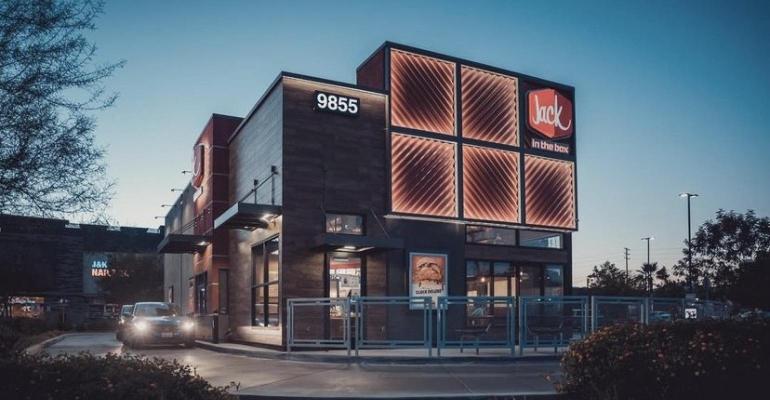Jack in the Box Inc., parent to the quick-service burger concept and Del Taco, is highlighting value and seeing some challenges on attach rates for items among some consumers, especially those with incomes of $45,000 and less, executives said Wednesday.
“Our focus is about making sure we understand our consumers by all segments and dayparts,” said Darin Harris, CEO of the San Diego, Calif.-based quick-service company, which released earnings for the Jan. 21-ended first quarter, in a call with analysts.
“We're seeing the same thing that most of our competition is,” Harris said. “The consumer that's $75,000 and under, particularly the $45,000 and under, you're definitely seeing some challenges with attach rates. … Our focus is: How do we make sure that we have the right breakfast offerings, the right offerings and deals through digital channels, that we have the right value menu?”
Harris said value options range from the $3 wrap to the $12 Munchie Meals as well as digital channel offers like two tacos for 99 cents, where Jack in the Box is “getting even more aggressive through that channel to build loyalty members.”
He added: “In today's competitive environment, we are looking to provide even more everyday value. So look for an improved Jack's deal menu, providing a variety of value for the budget-conscious guest.”
Harris also said the breakfast daypart remains important and will remain a regular part of the marketing calendar, “innovating around new breakfast items while continuing to roll out fan-favorite LTOs such as French Toast Sticks or Mini Cinnis, and testing new breakfast offers, especially through digital channels, to target and reengage the valued guest.”
 At the higher end, Harris said he was especially excited about the full-scale launch of the premium Smashed Jack burger in March and what it can do for sales in the year ahead.
At the higher end, Harris said he was especially excited about the full-scale launch of the premium Smashed Jack burger in March and what it can do for sales in the year ahead.
“We believe that it can help us throughout the year really outperform what we anticipate with some of the headwinds that we're facing right now,” he said.
“The industry as a whole has seen some softness at the start of the year,” Harris added, suggesting wet weather in January “probably impacted us somewhere between a half a point in sales for the quarter. But we do know that going into the year we had a strong back-end plan with our marketing calendar.”
Harris said both brands continued to accelerate digital sales, having achieved 12% of total revenue with year-over-year growth in all channels and “particularly strong growth in first-party web and app ordering.”
At the company’s investor day earlier in the year, the company said it wanted to increase average unit volumes past $2.5 million for Jack in the Box and $2 million for Del Taco.
For the first quarter ended Jan. 21, Jack in the Box reported net income of $53.3 million, or $2.54 a share, compared to $38.7 million, or $1.93 a share, in the same period a year ago. Revenues in the quarter were $527.1 million, up from $487.5 million in the prior-year period.
In the first quarter, Jack in the Box same-store sales were up 0.8% and Del Taco same-store sales were up 2.2%. Brian Scott, Jack in the Box chief financial officer, said the Jack in the Box increase included comparisons of increased company-owned same-store sales of 2% and franchise comps of 0.7%. The Del Taco comparison of company-owned comps of 1.8% and franchise comps of 2.4%.
As of Jan. 21, the company had 2,784 restaurants, including 2,192 Jack in the Box units and 592 Del Taco locations. Of the Jack in the Box restaurants, 144 were company-owned and 2,048 were franchised in 22 states. Of the Del Taco units, 179 were company-owned and 413 were franchised in 16 states.
Contact Ron Ruggless at [email protected]
Follow him on X/Twitter: @RonRuggless





